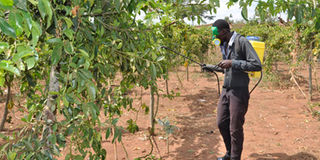Taxes on agro inputs a set back - experts

A farmer in Iganga District sprays his passion fruit plants against pests. With taxes now levied on agro inputs and equipment, the move may act as a discentive for farmers as it increases their costs. PHOTO BY CHRISTINE KATENDE
What you need to know:
The 2014/2015 national Budget introduced measures in agriculture, which have drawn criticism.
With about 80 per cent of the country dependent on agriculture for their livelihoods, the removal of tax exemptions on agricultural inputs and introduction of other taxes has come as surprise, if not a shocker.
On June 12, while reading the 2014/2015 National Budget, the Finance minister, Maria Kiwanuka, pronounced removal of tax exemptions on agro-inputs, poultry and livestock feeds, terminated exemption on interest income on agricultural loans and introduced value-added tax (VAT) on packaging materials.
Who is affected?
“This is a bad situation especially for country that is looking out to get better,” says Gideon Badagawa, executive director, Private Sector Foundation Uganda (PSFU). “Now government has introduced taxes on agriculture which is the country’s competitive advantage to grow exports. This will see farmers invest less, thus there will be less jobs and less production.”
The argument in favour is that farmers will not be affected as the taxes will be passed on to the final consumer. Also, that smallholder farmers, who are the majority, do not use fertilisers, improved seeds and agro-chemicals. So, they will hardly be affected.
Reacting to this, Caleb Gumisiriza, policy research and advocacy manager, Uganda National Farmers Federation (UNFFE), points out that the smallholder farmers will definitely be affected.
Higher costs
“A farmer is the final consumer of these inputs since most of the food the farmers produce is for home consumption. So, these farmers cannot pass VAT to anybody else,” Gumisiriza says.
He adds that UNFFE works with smallholder farmers to promote productivity enhancing technologies, which include improved seeds, planting materials, agro-chemicals and fertilisers.
“In eastern Uganda, for instance, even a farmer who wants to plant quarter of an acre of maize will buy improved seed, apply fertilisers and use chemicals to control pests,” Gumisiriza shares as he explains that farmers are using less of these inputs due to the high costs involved. And specifically for fertilisers, this makes them expensive.
He asserts that there is a disconnect between government’s intention to promote commercial farming and the introduction of taxes on agro-inputs.
“If there is some truth that few farmers are using fertilisers, improved seeds and agro-chemicals, the solution would not lie in making these inputs even more expensive and therefore ‘a no-go area to small scale farmers’, but rather, in making the inputs even cheaper through provision of subsidies and other incentives.”
Losses to increase
This action will not motivate the smallholder farmers into buying these inputs and move on to become semi-commercial or commercial farmers.
On the termination of exemptions on interest income on agricultural loans, UNFFE’s view is that it will be even harder for a small- and medium-scale farmer to access finance for farming.
Post-harvest losses in Uganda account for 30-40 per cent of the total harvest and this is mainly attributed to lack of processing or value addition equipment.
“With taxes on such equipment, we should then expect the percentage of losses to increase,” Gumisiriza warns.
Players in the feeds industry expressed concern about the minister’s pronouncement. The farmers already threatened by high costs may opt to either mix their own feed or buy feed from elsewhere, which could be substandard.
More time
“The bulk of cereals or unprocessed grains such as maize and soya are gathered from farmers by middle men who also fall below the VAT threshold. We believe this is the same reason our neighbours in Kenya have withdrawn the proposed VAT on poultry feeds,” UNFFE’s statement reads in part.
And the absence of regulation in the industry provides a loophole for the informal players to compromise feed quality. The substandard feeds also lower yields of poultry and livestock farmers.
“The agricultural sector is struggling to increase the use of agro-chemicals, improved seeds and fertilisers, thus, there is need for more time before government could think of taxes on inputs,” Gumisiriza concludes.
vat to be paid on:
Supply of feeds for poultry and livestock
Supply of agriculture and diary machinery
Supply of packaging materials to diary and milling industries
Supply of specialised vehicles, plant and machinery services and civil works related to roads and bridges construction, agriculture, water
Supply of cereals, grown, milled or produced in Uganda
Supply of processed milk and milk products
Supply of machinery and tools for agriculture
Supply of seeds, fertilisers, pesticides and hoes




